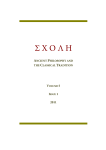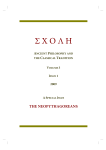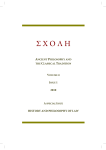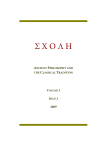Schole. Философское антиковедение и классическая традиция @classics-nsu-schole
Статьи журнала - Schole. Философское антиковедение и классическая традиция
Все статьи: 755
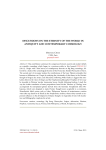
Discussions on the eternity of the world in antiquity and contemporary cosmology
Статья научная
This contribution continues the comparison between ancient and modern beliefs on scientific cosmology which began in a previous article in this Journal (ΣΧΟΛΗ 5.2 [2011]). I begin with a brief survey of contemporary theories on Big Bang cosmology, followed by a study of the cosmological theories of the Presocratic thinker Pherecydes of Syros. The second part of my paper studies the ramifications of the basic Platonic principle that bonum est diffusivum sui. I begin by studying the vicissitudes of this theory in the Patristic thought of Origen, the Arians, and Athanasius. Following Willy Theiler, I suggest that similarities between the views of Origen and the Neoplatonist philosopher Porphyry of Tyre may be traceable to Plotinus' teacher Ammonius Saccas. Finally, following Endress, I study the way the Arabic translation of some propositions from Proclus' Elements of Theology were accompanied by interpolated glosses derived from the Christian Neoplatonist John Philoponus, which were designed to make Proclus' thought more acceptable to a creationist, Monotheistic belief system such as Islam. Philoponus' theories of instantaneous creation were taken up, thanks to al-Kindi, by the Neoplatonica Arabica, whence they exerted an important influence on the development of Islamic thought. An Appendix of texts with translation and bibliography completes the article.
Бесплатно
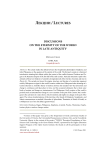
Discussions on the eternity of the world in late antiquity
Статья научная
This article studies the debate between the Neoplatonist philosophers Simplicius and John Philoponus on the question of the eternity of the world. The first part consists in a historical introduction situating their debate within the context of the conflict between Christians and Pagan in the Byzantine Empire of the first half of the sixth century. Particular attention is paid to the attitudes of these two thinkers to Aristotle's attempted proofs of the eternity of motion and time in Physics 8.1. The second part traces the origins, structure and function of a particular argument used by Philoponus to argue for the world's creation within time. Philoponus takes advantage of a tension inherent in Aristotle's theory of motion, between his standard view that all motion and change is continuous and takes place in time, and his occasional admission that at least some kinds of motion and change are instantaneous. For Philoponus, God's creation of the world is precisely such an instantaneous change: it is not a motion on the part of the Creator, but is analogous to the activation of a state (hexis), which is timeless and implies no change on the part of the agent. The various transformations of this doctrine at the hands of Peripatetic, Neoplatonic, and Islamic commentators are studied (Alexander of Aphrodisias, Themistius, al-Kindi, al-Farabi), as is Philoponus' use of it in his debate against Proclus.
Бесплатно
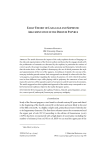
Early Theory of Language and Sophistic Argumentation in the Derveni Papyrus
Статья научная
The article discusses the impact of the early sophistic theories of language on the style and argumentation of the Derveni author and shows that he engages deeply with the problematics of semantics as discussed by the sophists, in particular the notions of correct speech, the proper meanings of words, synonymy and homonymy. Aristotle notes that the main device of the sophists is homonymy, the use of which permeates the style and argumentation of the text of the papyrus. According to Aristotle, the concept of homonymy includes general notions. Such an approach can already be observed in the Derveni papyrus, in particular regarding the notion of sameness (τὸ αὐτό) which the author uses in three different ways while playing with its polysemy: the sameness of one and many, the sameness of the opposite aspects of one process and the sameness of synonyms. The article suggests how this sophisticated approach of the author may correspond to earlier hermeneutic traditions related to the orphic theogonic poems.
Бесплатно
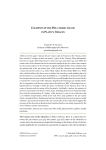
Elements in the Pre-cosmic Chaos in Plato’s Timaeus
Статья научная
In this paper I discuss the pre-cosmic state of elements in the Timaeus, when they existed as “vestiges of their own nature” (53b2). In the Timaeus, Plato distinguishes between two states of the elements: pre-cosmic (47e-53c) and cosmic (53c-57d). While the cosmic state of the elements has been extensively analyzed, the pre-cosmic state remains less clear and continues to be the topic of ongoing scholarly debate. Some scholars share the opinion that in the pre-cosmic state of the world the elements were bodies having certain stereometric forms (e. g. Archer-Hind, Taylor, Mortley, Mohr, Miller etc.). While other scholars believe that there were no bodies, but some forces and qualities placed in the Receptacle (e. g. Cornford, Zeyl, Waterfield etc.). I would like to demonstrate that the first interpretation is more consistent with Plato's overall thought than the second. Firstly, I examine the cosmic state of the elements, shaped by the Demiurge into regular polyhedra, in comparison with the pre-cosmic chaos, described as a "field" of heterogeneous, unbalanced forces. Secondly, I define the status of elements in the Timaeus, their role as causes of motion, and the nature of the Receptacle. And finally, I analyze the opinions of ancient commentators on the pre-cosmic chaos, including the presence of primary bodies there and the interpretation of "vestiges" of the elements. I came to the conclusion, that (1) Cornford's interpretation, which posits only forces and qualities in the pre-cosmic chaos, contradicts Plato's fundamental premise that physical movement requires a bodily substrate.; and (2) the description of the pre-cosmic state of the world, which suggests the presence of the elements as disordered and unformed bodies, was widely supported by the views of Plato's ancient commentators.
Бесплатно
![Etymology of the nickname 'Iskarit(h): the “one who saw a sign” [('I)sqar(^i)'^o/yisqar(^i)'^o] or the “one who slandered/betrayed a sign” [('I)sqar(^i)'^o/yisqar(^i)'^o]? Etymology of the nickname 'Iskarit(h): the “one who saw a sign” [('I)sqar(^i)'^o/yisqar(^i)'^o] or the “one who slandered/betrayed a sign” [('I)sqar(^i)'^o/yisqar(^i)'^o]?](/file/thumb/147103397/etymology-of-the-nickname-iskarit-hthe-one-who-saw-a-sign-i-sqar-i.png)
Статья научная
The article derives Judas's nickname 'Iskariṓt(h) from the Hebrew/Aramaic verb sāqar/seqar, and the noun 'ōṯ/'ôṯ (widely used in Biblical Hebrew and attested in the Talmud [=Aramaic 't/'t']), and interprets it as the “one who saw/gaze upon a sign” (cf., e.g., John 2:23, 4:48, 6:2,14,30 mentioning those who «saw signs» and came to be Jesus's followers; the verbs theōréō and ‘oráō used in these passages correlate with the verb sāqar/seqar, “to look (at), gaze, see”, and the noun sēmeîon (pl. sēmeîa) correlates with the term 'ōṯ/'ôṯ, “sign”). The ex hypothesi “positive” character of Judas's nickname possibly explains the evangelists' renunciation of its interpretation. As an alternative etymology of Judas's nickname 'Iskariṓt(h), one can derive it from the Hebrew/Aramaic verb šāqar/šeqar (“to lie, deceive, slander”, sc. “to violate (a treaty, etc.)”, “to betray” [the latter meaning is attested in Samaritan Aramaic]) and the same noun 'ōṯ/'ôṯ: the “one who slandered/resp. betrayed a sign”, i.e. the one who brought false evidence against Jesus (сf.: Matt. 26:59 ff.; Mk. 14:55 ff.). In Jn. 6:70, Jesus himself defines Judas with the term diábolos; this word can be interpreted as “slanderer”, “accuser”.
Бесплатно
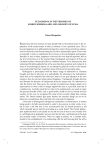
Eudamonia in the theories of Soren Kierkegaard and Gregory of Nyssa
Статья научная
Panos Eliopoulos (University of Athens) carries out a comparative analysis of the concept of happiness of two Christian philosophers who lived at different times and in different cultural traditions, Søren Kierkegaard and Gregory of Nyssa.
Бесплатно
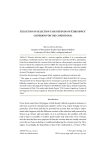
Execution in selection task depends on Chrysippus’ criterion for the conditional
Статья научная
Wason’s selection task is a current cognitive problem. It is a reasoning task including a conditional sentence that only sometimes is correctly solved by participants. It has been claimed that the versions of the task that are often properly executed are only those in which the conditional sentence fulfills the criterion given by Chrysippus of Soli for the conditional. In this paper, this point is checked by considering a relevant number of versions of the aforementioned task in order to review whether or not their conditionals meet Chrysippus’ requirement.
Бесплатно
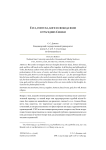
Fata, Fortuna, боги и свобода воли в трагедиях Сенеки
Статья научная
В данной статье исследуются взгляды Сенеки на судьбу (фата), удачу (фортуна), богов и свободу воли на основе анализа его трагедий. Во всех своих пьесах и философских трудах этот римский автор пишет о силе фаты, фортуны и богов, о предопределении хода событий и о необходимости проявлять смирение и почитать богов. Однако в трагедиях, написанных в 40-50-х годах, персонажи винят в своих несчастьях фату, фортуну и богов, которые способны испытывать эмоции (ненависть, гнев, раздражение) и причинять вред смертным. Это противоречит стоическим взглядам Сенеки. Идеи о фате, фортуне, богах и свободе воли, представленные в драмах 60-х годов, больше похожи на его мысли, изложенные в философских трудах.
Бесплатно

Federico Fellini and Homer: Parallels and intersections
Статья научная
This essay is an outgrowth of the topic considered in the previous articles devoted to the image of ancient and modern Rome in Federico Fellini’s films, in which an attempt to analyse several Homeric motifs in Fellini Satyricon (1969) was made. The Italian film director acknowledged that he had dreamed to make a film based on the European ‘Book of the Books’, Homer’s duology – the Iliad and the Odyssey – about the heroes of the Trojan cycle of myths. Other coincidences in Fellini and Homer constitute the object of this study. Deliberate? Fortuitous? Archetypic? Fanciful? The very wording of the topic – Fellini Satyricon as Fellini’s Iliad – is provocative. The article identifies and discusses the parallels and intersections in the works of the two great masters – the Ancient Greek poet and the classic of Italian cinematograph, who lived almost three millennia apart.
Бесплатно
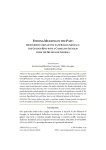
Статья научная
This paper offers a novel interpretation of the luxury golden ring with a carnelian intaglio depicting a woman's profile and an engraved Greek inscription, ΒΑCIΛICCΑ ΟΥΛΠIAΝΑ(Ζ)IA (or AΣIA E.A.), found in cist grave 14, in Mtskheta, Georgia, dated to the Roman period, the 3rd century AD. In consideration of the then contemporary political situation in the Mediterranean and Roman East, through the putting and interpreting sources into broad historical context, the author identifies the female individual as the Roman Empress Ulpia Severina. The very inclusion of royal woman within public propaganda during this period signifies her prominence within, and significance outside of, the imperial metropolis. This deliberate inclusion proved to the public that this empress was not mere figurehead but could have been a very influential person in the Empire.
Бесплатно
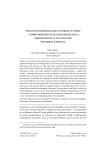
Статья научная
L'auteur de l'article tente de relier l'observation des relations économiques et commerciales développées par les Phéniciens dans la partie occidentale de la Méditerranée à une réflexion sur la situation dans laquelle se trouvaient les pays du Levant. On sait qu'à l'époque où la fondation de Carthage peut être hypothétiquement localisée, les centres phéniciens étaient sous pression politique, économique et militaire - principalement de l'Assyrie - bien que d'autres puissances, comme Damas, ne puissent être exclues. D'autre part, cependant, on sait que, par exemple, dans la science allemande l'absence d'acte fondateur de Carthage en Afrique du Nord a été soulignée, et les traces archéologiques laissées sur ce territoire semblent insuffisantes pour concilier les relations littéraires conventionnelles avec l'acte fondateur. de Carthage à la fin du IXe siècle av. L'intention de cet article est de tenter de montrer les enjeux à partir desquels il convient d'envisager la réinterprétation des événements rapportés dans le contexte de la fondation de Carthage. Cette démarche servirait à réviser les connaissances scientifiques existantes sur la chronologie de la fondation de Qarthadasht et pourrait, par conséquent, contribuer à montrer que la fondation de Carthage s'inscrit dans une période postérieure - c'est-à-dire la fin du VIIIe ou le début du VIIe. siècle avant notre ère.
Бесплатно
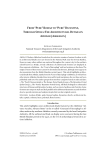
Статья научная
Modern Ashkelon, founded on the extensive remains of ancient Ascalon, is rich in architectural details; most are focused in the National Park near the Severan Basilica. However, many other artifacts are scattered throughout the current city. In the northern suburb known as Afridar, several collections of architectural elements are displayed at three open-air exhibitions—the “Court of Sarcophagi” and two locations on the shore. The origins of most of these items cannot be determined at this time, although some appear in documentation from the British Mandate period (1930s). This article highlights architectural details from Afridar, mainly from the “Court of Sarcophagi” exhibition, as well as from other sites in Ashkelon. Besides three items with Greek inscriptions, the rest have not been published until now. The author groups them into four categories based on style and date: 1. The “Purely” Roman details; 2. The Roman-Period Spolia Group; 3. The Byzantine-Period Spolia Group; 4. The “Purely” Byzantine-Period Group. All likely belonged to colonnaded structures of Roman and Byzantine Ascalon, such as streets, basilicas, and churches. Some elements are unique in style and lack parallels in local Roman-Byzantine art, and therefore deserve special attention and analysis despite their unclear original context.
Бесплатно
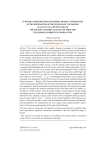
Статья научная
The author considers three possible Aramaic etymologies of the designation Ἐσσαῖοι/Ἐσσηνοί: (1) Since, according to reiterated Josephus Flavius' accounts and the Dead Sea scrolls' evidences, the Essenes and the Qumranites, closely associated with them, believed in predestination and foretold the future, they could be called: those, who believe in predestination, sc. the “fatalists”, “determinists”; or: those, who predict fate, i.e. the “foretellers”. This hypothetical etymology is derived from the Aramaic word ḥaššayyā᾿ (m. pl. in st. det.; resp. ḥš(᾿)(y)yn in st. abs.) reconstructed by the author from the term ḥšy/ḥš᾿ (“what man has to suffer, predestination, fortune”) after the model: C1aC2C2aC3. (2) In the present author's opinion, the Qumran community held itself allegorically to be the “root(s)” and “stock” of Jesse, giving life to the “holy" Davidic “Shoot” (see: Isa. 11:1); or, in other words, the Qumranites appear to have considered their Yaḥaḏ (lit. “Unity/Oneness”) the personification of a new Jesse, who would “beget” and “bring up” a new David. (Cf., e.g., 1QSa, II, 11-12: “When [God] begets (yôlîḏ) the Messiah with them (᾿ittām; i.e. the sectarians. - I. T.)...”.) Proceeding from this doctrine, one can assume the etymology of the designation Ἐσσαῖοι/Ἐσσηνοί from the Aramaic-Syriac spelling of King David father's name Jesse - ᾿Κ(š)ay. (3) The Essenes' and the Qumranites' aloofness from this world and their striving for interrelations with the other world could be a reason, by which they came to be regarded as “liminal” personalities and nicknamed (probably, with a tinge of irony) after the name of “rephaites” (the original vocalization seems to have been: rōfĕ᾿îm, lit. “healers”, sc. “benefactors”) of former times, whom they really recalled in some key aspects of their outlook and religious practice. In this case, the designation θεραπευταί, “healers”, - applied in Jewish Hellenized circles, primarily, in Egypt, to the members of the (ex hypothesi) Essenean communities of mystic-“gnostic” trend - could be in fact a Greek translation of the Hebrew term rōfĕ᾿îm. It also seems natural to assume that this designation of the sectarians could be interpreted/translated by the uninitiated by the word ᾿āsayyā᾿/᾿āsên, meaning “healers”, “physicians”, in the Aramaic-speaking milieu of the region of Syria-Palestine.
Бесплатно
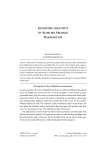
Geometric creativity of Ajami ibn Abubakr Nakhchivani
Статья научная
This article examines the geometric patterns that decorate three mausoleums from Nakhchivan, built in the second half of the 12th century. The architect of two mausoleums was Ajami ibn Abubakr, and the third mausoleum was also built either by him or by someone from his school. Among these patterns are simple and well-known ones, as well as complicated and original ones, undoubtedly invented by him. For each pattern, its structure and the possible idea of its invention are discussed.
Бесплатно



